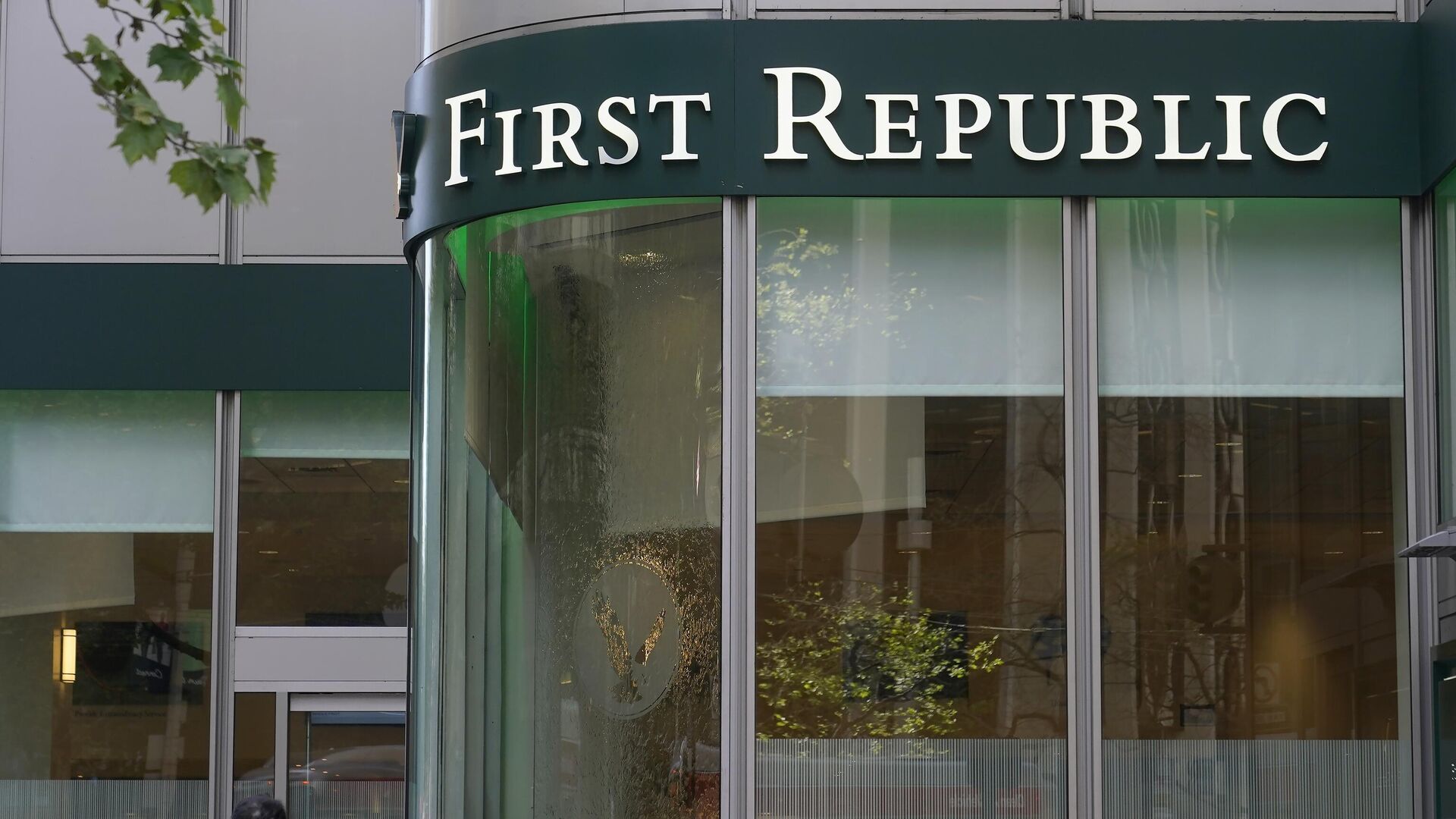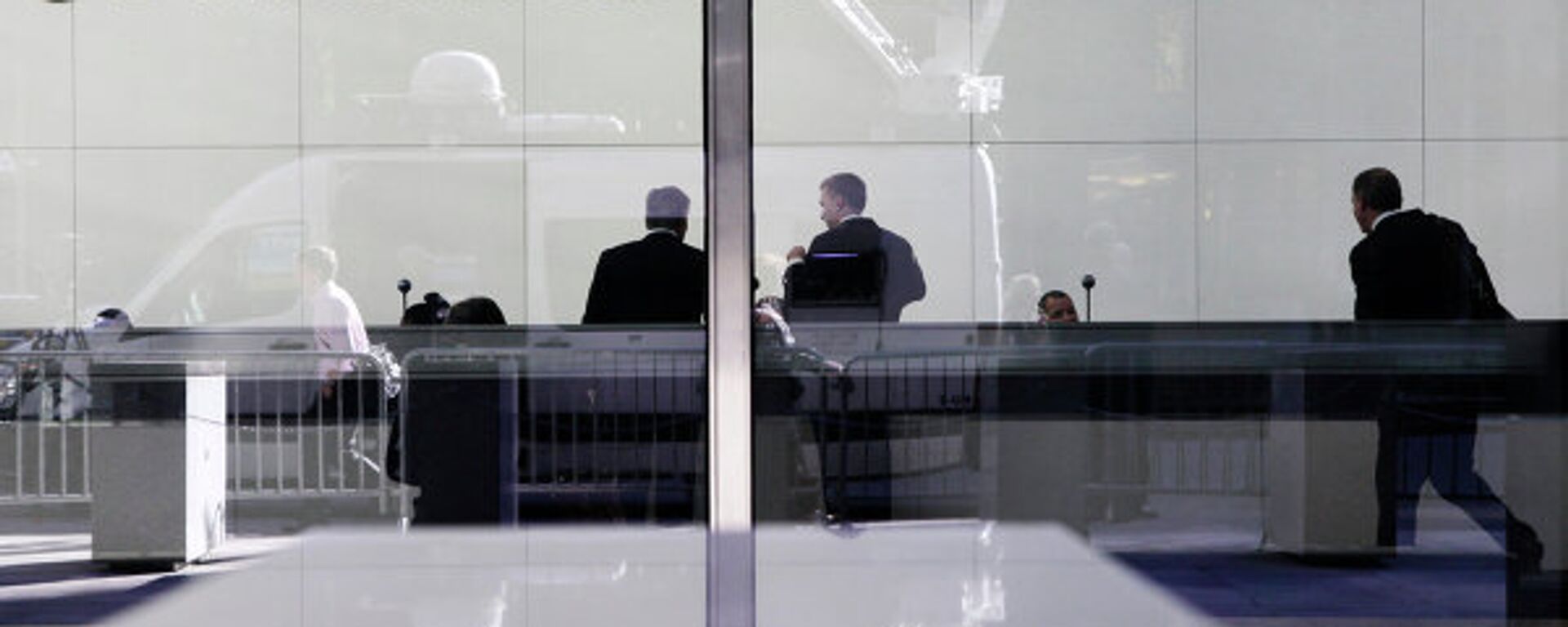https://sputnikglobe.com/20230502/first-republic-bank-bailout-part-of-trend-towards-finance-oligopoly-1110025705.html
First Republic Bank Bailout Part of Trend Towards Finance 'Oligopoly'
First Republic Bank Bailout Part of Trend Towards Finance 'Oligopoly'
Sputnik International
'Big Four' bank JPMorgan Chase has been named as the buyer for failing First Republic Bank. Mark Frost and Robert Hockett warned that soon there would be only a handful of finance houses left in the US.
2023-05-02T16:10+0000
2023-05-02T16:10+0000
2023-05-02T17:16+0000
economy
us
first republic bank
jp morgan
jp morgan chase
bailout
monopoly
monopolization
bankruptcy
https://cdn1.img.sputnikglobe.com/img/07e7/04/1d/1109939469_0:0:3072:1728_1920x0_80_0_0_07a03b828ee18571f2d734ac6d473c43.jpg
US finance giants are "swallowing" smaller regional banks with the help of the federal reserve, two academics have said.The First Republic Bank became the latest US finance institution to go bankrupt on Monday, following the collapse of Silicon Valley Bank (SVB), Signature and Silvergate Bank in March.The Federal Deposit Insurance Corporation (FDIC) financial watchdog seized control of First Republic and announced that New York-based corporate banking giant JPMorgan Chase would buy it out.The latest bank failure has reignited fears of a repeat of the 2008 'Credit Crunch' financial crisis as the White House weighs up whether to bail out investors or only customers — up to the deposit insurance cap.Robert Hockett told Sputnik that the bailout did not come "out of the kindness of JP Morgan's heart" but was part of gradual monopolisation of the finance sector.He explained that JPMorgan had already benefitted from a "huge deposit exodus" from smaller banks since the run on SVB — sparked by the Federal Reserve raising interest rates and undermining the value of its government bond portfolio — that led to its collapse. Depositors with regional and industry-specific banks are seeing "the writing on the wall" and moving their accounts to the 'Big Four' banks considered "too big to fail," safe in the knowledge that that the US Treasury, FDIC and the Federal Reserve would not allow them to go bankrupt.Meanwhile the Federal Reserve and the government itself is paying huge sums to JPMorgan "to assist it in its digestion of this giant egg that the snake is swallowing," Hockett said. That policy could set the stage for the "complete concentration of the US banking sector into an oligopoly, with maybe a big three or a big two, even maybe even a big one."Mark Frost also warned of consolidation in the sector tending towards a monopoly."What we're really witnessing here is a centralization or an oligopolistic formation within the financial services — or more specifically banking — space," Frost told Sputnik. "We're taking banks that have risk for depositors and we're transferring those accounts, slowly but surely, to the banks that we've deemed as a society to be too big to fail."He said the First Republic bailout had cost the FDIC $18 billion of its $45-billion emergency fund.He agreed with Hockett's assessment that the US treasury's policy of treating only the 'big four' banks as indispensable was helping wipe out their smaller rivals. "If you look at it as banking dollars, the top ten banks in the United States have 90 per cent of the money," he pointed out. "One in four people have a have an account at Bank of America."For more cracking soundbites from our top commentators, check out our Telegram channel.For more in-depth analysis, follow our Sputnik Radio shows.
https://sputnikglobe.com/20230502/us-banking-crisis-nearly-over-after-jpmorgan-chase-scoops-up-first-republic-in-auction-1110017848.html
Sputnik International
feedback@sputniknews.com
+74956456601
MIA „Rossiya Segodnya“
2023
James Tweedie
https://cdn1.img.sputnikglobe.com/img/07e4/08/1c/1080307270_0:3:397:400_100x100_80_0_0_7777393b9b18802f2e3c5eaa9cbcc612.png
James Tweedie
https://cdn1.img.sputnikglobe.com/img/07e4/08/1c/1080307270_0:3:397:400_100x100_80_0_0_7777393b9b18802f2e3c5eaa9cbcc612.png
News
en_EN
Sputnik International
feedback@sputniknews.com
+74956456601
MIA „Rossiya Segodnya“
Sputnik International
feedback@sputniknews.com
+74956456601
MIA „Rossiya Segodnya“
James Tweedie
https://cdn1.img.sputnikglobe.com/img/07e4/08/1c/1080307270_0:3:397:400_100x100_80_0_0_7777393b9b18802f2e3c5eaa9cbcc612.png
mark frost, robert hockett, first republic bank, jpmorgan chase, bankruptcy, bailout, monopolization, banking, crisis
mark frost, robert hockett, first republic bank, jpmorgan chase, bankruptcy, bailout, monopolization, banking, crisis
First Republic Bank Bailout Part of Trend Towards Finance 'Oligopoly'
16:10 GMT 02.05.2023 (Updated: 17:16 GMT 02.05.2023) 'Big Four' bank JPMorgan Chase has been named as the buyer for failing First Republic Bank. Economist, professor and consultant Mark Frost and Robert Hockett, a professor of law and public policy at Cornell University, warned that soon there would be only a handful of finance houses left in the US.
US finance giants are "swallowing" smaller regional banks with the help of the federal reserve, two academics have said.
The First Republic Bank became the latest US finance institution to go bankrupt on Monday, following the collapse of Silicon Valley Bank (SVB), Signature and Silvergate Bank in March.
The Federal Deposit Insurance Corporation (FDIC) financial watchdog seized control of First Republic and
announced that New York-based corporate banking giant JPMorgan Chase would buy it out.
The latest bank failure has reignited fears of a repeat of the 2008 'Credit Crunch' financial crisis as the White House weighs up whether to bail out investors or only
customers — up to the deposit insurance cap.
Robert Hockett told
Sputnik that the bailout did not come "out of the kindness of JP Morgan's heart" but was part of gradual monopolisation of the finance sector.
"What's happening is we're seeing a further concentration of the US banking sector," Hockett said. "So we're getting to the point where the one subsector remaining that is not itself a financialized, one-size-fits-all Wall Street conglomerate banking sector is itself now being gobbled up by the latter."
He explained that JPMorgan had already benefitted from a "huge deposit exodus" from smaller banks since the run on SVB — sparked by the Federal Reserve raising interest rates and undermining the value of its government bond portfolio — that led to its collapse. Depositors with regional and industry-specific banks are seeing "the writing on the wall" and moving their accounts to the 'Big Four' banks considered "too big to fail," safe in the knowledge that that the US Treasury, FDIC and the Federal Reserve would not allow them to go bankrupt.
"So that is itself then what is ultimately brought down First Republic and what brought down other regional banks before it," Hockett said, "and what is already shaking the stock prices of the remaining regional banks as of the opening bell again this morning."
Meanwhile the Federal Reserve and the government itself is paying huge sums to JPMorgan "to assist it in its digestion of this giant egg that the snake is swallowing," Hockett said. That policy could set the stage for the "complete concentration of the US banking sector into an oligopoly, with maybe a big three or a big two, even maybe even a big one."
Mark Frost also warned of consolidation in the sector tending towards a monopoly.
"What we're really witnessing here is a centralization or an oligopolistic formation within the financial services — or more specifically banking — space," Frost told
Sputnik. "We're taking banks that have risk for depositors and we're transferring those accounts, slowly but surely, to the banks that we've deemed as a society to be too big to fail."
He said the First Republic bailout had cost the FDIC $18 billion of its $45-billion emergency fund.
"Right now, even on the FDIC list, I think it just came out this morning, there's 171 more banks that are listed at risk," Frost noted. "And the list is growing at about 50 per cent per quarter."
He agreed with Hockett's assessment that the US treasury's policy of treating only the 'big four' banks as indispensable was helping wipe out their smaller rivals.
"If you are a big depositor, you have $3 billion deposit in the bank somewhere — you only do business with big banks because you know that they're going to be saved because they're too big to fail," Frost said.
"If you look at it as banking dollars, the top ten banks in the United States have 90 per cent of the money," he pointed out. "One in four people have a have an account at Bank of America."
For more cracking soundbites from our top commentators, check out our Telegram channel. For more in-depth analysis, follow our Sputnik Radio shows. 



